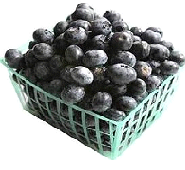NO MORE BLOOD SUGAR BLUES
Food and Mood—There’s a Direct Connection!
By Alice Osborne
 Our last Cook’n issue’s article, Cooking Boo Boos Food can make us feel crummy or good, both physically and emotionally. The food we eat fuels our bodies and also affects our minds. Certain foods can bring on depression, panic attacks, lethargy, and an over-all malaise. And then other foods make us feel warm and safe (comfort- and soul-food are two examples). Those of us dealing with blood sugar issues need to be very aware of this fact and be sure to choose foods that foster feelings of well-being so we continue to want to do and do what works best for us (diet- and exercise-wise).
Our last Cook’n issue’s article, Cooking Boo Boos Food can make us feel crummy or good, both physically and emotionally. The food we eat fuels our bodies and also affects our minds. Certain foods can bring on depression, panic attacks, lethargy, and an over-all malaise. And then other foods make us feel warm and safe (comfort- and soul-food are two examples). Those of us dealing with blood sugar issues need to be very aware of this fact and be sure to choose foods that foster feelings of well-being so we continue to want to do and do what works best for us (diet- and exercise-wise).
So what we eat affects how we feel and how we feel affects what we eat. When stressed we tend to overeat or under eat, neither of which is healthy. Food may be an escape; we eat because it makes us feel better. Or some people find that stress makes them not want to eat at all, they are too distracted or physically feel ill.
Let’s look, then, at how specific foods affect our moods. There are six ways:
 The power of association: We form emotional attachments to food because we associate it with things that have happened to us. Foods that were a big part of our childhood can bring back memories of that time in our lives. The aroma of a simmering stew makes us feel like we are backing home in our mom's kitchen!
The power of association: We form emotional attachments to food because we associate it with things that have happened to us. Foods that were a big part of our childhood can bring back memories of that time in our lives. The aroma of a simmering stew makes us feel like we are backing home in our mom's kitchen!
This phenomenon is especially strong during the holidays. A traditional turkey dinner at Christmas brings to mind the warmth and excitement (or any other experience) we felt as children during this time.
Serotonin and comforting carbohydrates: The foods that you eat can actually change the chemical composition of your brain. This influences you are feeling, your clarity of mind and how alert you are. For example, certain elements in food are precursors to neurotransmitters which are the chemical messengers that carry information between the cells in your brain. The amount of precursor available from your food affects the amount of neurotransmitter available to your brain cells.
When it comes to mood, one important neurotransmitter is serotonin. Serotonin affects our feeling of well-being. When serotonin is low, you are more likely to feel stressed, angry or depressed.
 According to Judith Wurtman, author of The Serotonin Power Diet, “Nature gave us an easy way of harnessing the power of our brain to control our appetite and mood. We don't need drugs, or supplements, herbs or pills. Just by eating the immense variety of carbs on this earth, we can lose weight, feel better, and maybe make everyone more peaceful.”
According to Judith Wurtman, author of The Serotonin Power Diet, “Nature gave us an easy way of harnessing the power of our brain to control our appetite and mood. We don't need drugs, or supplements, herbs or pills. Just by eating the immense variety of carbs on this earth, we can lose weight, feel better, and maybe make everyone more peaceful.”
Eating carbohydrates triggers the release of insulin into the bloodstream. Insulin clears out all of the amino acids in the bloodstream except for tryptophan. In the brain, Tryptophan is converted in into serotonin. Some healthy food choices for releasing serotonin include whole wheat bread, cereals and pastas.
 Protein makes you more alert: During digestion, proteins are broken down into their amino acid constituents. One of these amino acids is tyrosine which increases the production of the neurotransmitters norepinepherine, dopamine and epinephrine. These neurotransmitters are responsible for making us feel alert and energetic. Healthy choices include fish, poultry, lean meat and eggs.
Protein makes you more alert: During digestion, proteins are broken down into their amino acid constituents. One of these amino acids is tyrosine which increases the production of the neurotransmitters norepinepherine, dopamine and epinephrine. These neurotransmitters are responsible for making us feel alert and energetic. Healthy choices include fish, poultry, lean meat and eggs.
 Folic acid, selenium and fatty acids may help fight depression: Eat your spinach and drink your orange juice to keep depression at bay. Studies have shown levels of folic acid to be lower in people who are depressed. Eating foods high in folic acid may help prevent or alleviate mild depression.
Folic acid, selenium and fatty acids may help fight depression: Eat your spinach and drink your orange juice to keep depression at bay. Studies have shown levels of folic acid to be lower in people who are depressed. Eating foods high in folic acid may help prevent or alleviate mild depression.
 Brazil nuts, tuna, sunflower seeds and whole-grain cereals are all good sources of selenium. Studies have shown that people who have low levels of selenium are more anxious. Increasing levels of selenium helps to normalize mood.
Brazil nuts, tuna, sunflower seeds and whole-grain cereals are all good sources of selenium. Studies have shown that people who have low levels of selenium are more anxious. Increasing levels of selenium helps to normalize mood.
 Eat fatty fish such as salmon, mackerel and herring as well as omega-3 eggs. The fatty acids found in these foods are important to the health of nerve and brain cell membranes. Lack of these fats in your diet may put you at higher risk for depression.
Eat fatty fish such as salmon, mackerel and herring as well as omega-3 eggs. The fatty acids found in these foods are important to the health of nerve and brain cell membranes. Lack of these fats in your diet may put you at higher risk for depression.
 Protect you memory with eggs and berries: EGGS: Found in high concentrations in eggs, Choline is a vitamin B complex that is a precursor to the neurotransmitter acetylcholine which is linked to memory. Alzheimer's patients have been shown to have low levels of acetylcholine. Eating eggs and other foods rich in choline may help to ensure the availability of acetylcholine to your brain.
Protect you memory with eggs and berries: EGGS: Found in high concentrations in eggs, Choline is a vitamin B complex that is a precursor to the neurotransmitter acetylcholine which is linked to memory. Alzheimer's patients have been shown to have low levels of acetylcholine. Eating eggs and other foods rich in choline may help to ensure the availability of acetylcholine to your brain.
Check this informative Egg web page on What's Cooking America. It is the main web page on how to cook eggs.
 BERRIES: Eat lots of berries. Blueberries, raspberries, and goji berries as they all contain high levels of antioxidants which help to destroy free radicals that damage cells.
BERRIES: Eat lots of berries. Blueberries, raspberries, and goji berries as they all contain high levels of antioxidants which help to destroy free radicals that damage cells.
 Eating something sweet does make you feel happy: If you have the control to stop at just one cookie [are you kidding me?], this may be the quickest way to boost your mood. Eating foods high in fat and sugar causes the brain to release endorphins which send pleasure signals throughout the body. BUT, the caution here is that this happy mood is just a temporary fix, and this approach can create a boatload of health complications over the long haul. We all know lasting happiness comes from within, not from a sweet treat, so be careful with this suggestion.
Eating something sweet does make you feel happy: If you have the control to stop at just one cookie [are you kidding me?], this may be the quickest way to boost your mood. Eating foods high in fat and sugar causes the brain to release endorphins which send pleasure signals throughout the body. BUT, the caution here is that this happy mood is just a temporary fix, and this approach can create a boatload of health complications over the long haul. We all know lasting happiness comes from within, not from a sweet treat, so be careful with this suggestion.

Contribute to the Cook'n Club!
DVO would love to publish your article, prose, photography and art as well as your cooking, kitchen and nutrition tips, tricks and secrets. Visit the Newsletter Submission / Win Win for All section in our Forum for more information and details.
